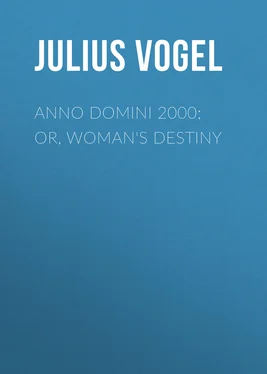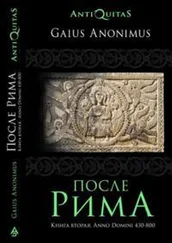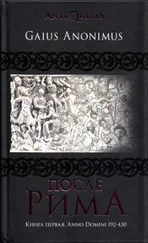Julius Vogel - Anno Domini 2000; or, Woman's Destiny
Здесь есть возможность читать онлайн «Julius Vogel - Anno Domini 2000; or, Woman's Destiny» — ознакомительный отрывок электронной книги совершенно бесплатно, а после прочтения отрывка купить полную версию. В некоторых случаях можно слушать аудио, скачать через торрент в формате fb2 и присутствует краткое содержание. Издательство: Иностранный паблик, Жанр: foreign_sf, literature_19, foreign_antique, foreign_prose, на английском языке. Описание произведения, (предисловие) а так же отзывы посетителей доступны на портале библиотеки ЛибКат.
- Название:Anno Domini 2000; or, Woman's Destiny
- Автор:
- Издательство:Иностранный паблик
- Жанр:
- Год:неизвестен
- ISBN:нет данных
- Рейтинг книги:4 / 5. Голосов: 1
-
Избранное:Добавить в избранное
- Отзывы:
-
Ваша оценка:
- 80
- 1
- 2
- 3
- 4
- 5
Anno Domini 2000; or, Woman's Destiny: краткое содержание, описание и аннотация
Предлагаем к чтению аннотацию, описание, краткое содержание или предисловие (зависит от того, что написал сам автор книги «Anno Domini 2000; or, Woman's Destiny»). Если вы не нашли необходимую информацию о книге — напишите в комментариях, мы постараемся отыскать её.
Anno Domini 2000; or, Woman's Destiny — читать онлайн ознакомительный отрывок
Ниже представлен текст книги, разбитый по страницам. Система сохранения места последней прочитанной страницы, позволяет с удобством читать онлайн бесплатно книгу «Anno Domini 2000; or, Woman's Destiny», без необходимости каждый раз заново искать на чём Вы остановились. Поставьте закладку, и сможете в любой момент перейти на страницу, на которой закончили чтение.
Интервал:
Закладка:
A summons so unusual raised a flush to the girl's cheek. She looked at Mrs. Hardinge.
"I had intended to tell you," said that lady, "that the Emperor mentioned he would like to speak to you on the subject we have been considering." Then, turning to the aide-de-camp, she said, "Miss Fitzherbert will immediately wait on his Majesty."
The officer left the room.
Hilda archly turned to Mrs. Hardinge. "So, dear mamma, you were preparing me for this interview?"
"Dear child," said the elder lady, "you want no preparation. Whatever the consequences to me, I will not ask you to put any restraint on the expression of your opinions."
CHAPTER II.
THE EMPEROR AND HILDA FITZHERBERT
The Emperor received Miss Fitzherbert with a cordial grace, infinitely pleasing and flattering to that young lady. She of course had often seen his Majesty at Court functions, but never before had he summoned her to a separate audience. And indeed, high though her official position and reputation were, she did not hold Cabinet rank; and a special audience was a rare compliment, such as perhaps no one in her position had ever previously enjoyed.
The Emperor was a tall man of spare and muscular frame, with the dignity and bearing of a practised soldier. It was impossible not to recognise that he was possessed of immense strength and power of endurance. He had just celebrated his twenty-seventh birthday, and looked no more than his age. His face was of the fair Saxon type. His eyes were blue, varying with his moods from almost dark violet to a cold steel tint. Few persons were able to disguise from him their thoughts when he fixed on them his eyes, with the piercing enquiry of which they were capable. His eyes were indeed singularly capable of a great variety of expression. He could at will make them denote the thoughts and feelings which he wished to make apparent to those with whom he conversed. Apart from his position, no one could look at him without feeling that he was a distinguished man. He was of a kindly disposition, but capable of great severity, especially towards any one guilty of a mean or cowardly action. He was of a highly honourable disposition, and possessed an exalted sense of duty. He rarely allowed personal inclination to interfere with public engagements; indeed, he was tenaciously sensitive on the point, and sometimes fancied that he permitted his judgment to be obscured by his prepossessions when he had really good grounds for his conclusions. On the very subject of his marriage he was constantly filled with doubt as to whether his objection to the proposed alteration in the law of succession was well founded on public grounds or whether he was unconsciously influenced by his personal disinclination to the contemplated union. He realised the truth of the saying of a very old author—
"Uneasy lies the head that wears a crown."
After indicating to Miss Fitzherbert his wish that she should be seated, he said to her, "I have been induced to ask your attendance by a long conversation I have had with Mrs. Hardinge. I have heard the opinions she has formed, and they seem to me the result of matured experience. It occurred to me that I would like to hear the opinions of one who, possessed of no less ability, has been less subject to official and diplomatic exigencies. I may gather from you how much of personal feeling should be allowed to influence State affairs."
"Your Majesty is very gracious," faltered Hilda, "but Mrs. Hardinge has already told you the opinion of the Cabinet. Even if I differed from it, which I do not, I could not venture to obtrude my view on your Majesty."
"Yes, you could," said the Emperor, "if I asked you, or let me say commanded you."
"Sir, your wishes are commands. I do not pretend to have deeply studied the matter. I think the time has come to finally settle a long-mooted question and to withdraw from woman the last disability under which she labours."
"My objection," interposed the Emperor, "or hesitation is in no manner caused by any doubt as to woman's deserving to be on a par with man in every intellectual position."
"Then, Sir, may I ask, why do you hesitate? The greatest Sovereign that ever reigned over Great Britain, as it was formerly called, was a woman."
"I cordially agree with you. No Sovereign ever deserved better of the subjects of the realm than my venerated ancestress Queen Victoria. But again I say, I do not question woman's ability to occupy the throne to the greatest advantage."
"Why, may I ask, then does your Majesty hesitate?"
"I can scarcely reply to my own satisfaction. I give great heed to the objections commonly stated against altering the Constitution, but I do not feel certain that these alone guide me. There is another, and to me very important, reason. It appeals to me not as Sovereign only, but as soldier. My father and my grandfather led the troops of the Empire when they went forth to battle. Happily in our day war is a remote contingency, but it is not impossible. We preserve peace by being prepared for war. It seems to me a terrible responsibility to submit to a change which might result in the event of war in the army not being led by its emperor."
"Your Majesty," said Miss Fitzherbert, "what am I to say? To deny the cogency of your reasons is like seeking to retain power, for you know the fate of the Cabinet depends upon this measure, to which it has pledged itself."
"Miss Fitzherbert," said the Emperor gravely, "no one will suspect you of seeking to retain office for selfish purposes, and least of all would I suppose it, or I would not ask your counsel. Tell me now," he said, with a winning look, "as woman to man, not as subject to Sovereign, what does your heart dictate?"
"Sir," said Miss Fitzherbert with great dignity, rising from her seat, "I am deeply sensible of the honour you do me; and I cannot excuse myself from responding to it. In the affairs of life, and more especially State affairs, I have noticed that both sides to a controversy have frequently good grounds for their advocacy; and, moreover, it often happens that previous association fastens on each side the views it holds. I am strong in the belief, we are right in wishing this measure to pass; but since you insist on my opinion, I cannot avoid declaring as far as I, a non-militant woman, can judge, that, were I in your place, I would hold the sentiment you express and refuse my sanction."
Hilda spoke with great fervour, as one inspired. The Emperor scarcely concealed his admiration; but he merely bowed courteously, and ended the interview with the words, "I am greatly indebted to you for your frankness and candour."
CHAPTER III.
LORD REGINALD PARAMATTA
As Miss Fitzherbert returned to her room, she did not know whether to feel angry or pleased with herself. She was conscious she had not served the interest of her party or of herself, but she realised that she was placed in a situation in which candour was demanded of her, and it seemed to her that the Emperor was the embodiment of all that was gracious and noble in man.
Her secretary informed her that Lord Reginald Paramatta was waiting to see her by appointment.
Lord Reginald was a man of noticeable presence. Above the ordinary height, he seemed yet taller because of the extreme thinness of his frame. Yet he by no means wore an appearance of delicacy. On the contrary, he was exceedingly muscular; and his bearing was erect and soldierlike. He was well known as a brilliant officer, who had deeply studied his profession. But he was not only known as a soldier: he held a high political position. He had for many years continued to represent an Australian constituency in the Federal Parliament. His naturally dark complexion was further bronzed by exposure to the sun. His features were good and strikingly like those of his sister, the Countess of Middlesex. He had also the same sinister expression. The Paramattas were a very old New South Wales family. They were originally sheep-farmers, or squatters as they used to be called. They owned large estates in New South Wales and nearly half of a thriving city. The first lord was called to the peerage in 1930, in recognition of the immense sums that he had devoted to philanthropic and educational purposes. Lord Reginald was the second son of the third and brother of the fourth peer. He inherited from his mother a large estate in the interior of New South Wales.
Читать дальшеИнтервал:
Закладка:
Похожие книги на «Anno Domini 2000; or, Woman's Destiny»
Представляем Вашему вниманию похожие книги на «Anno Domini 2000; or, Woman's Destiny» списком для выбора. Мы отобрали схожую по названию и смыслу литературу в надежде предоставить читателям больше вариантов отыскать новые, интересные, ещё непрочитанные произведения.
Обсуждение, отзывы о книге «Anno Domini 2000; or, Woman's Destiny» и просто собственные мнения читателей. Оставьте ваши комментарии, напишите, что Вы думаете о произведении, его смысле или главных героях. Укажите что конкретно понравилось, а что нет, и почему Вы так считаете.












